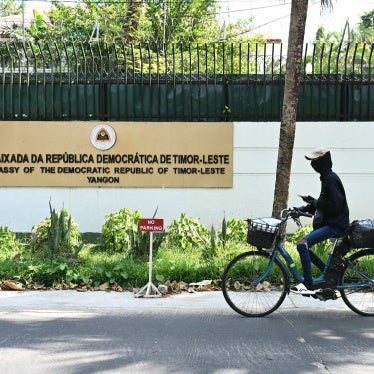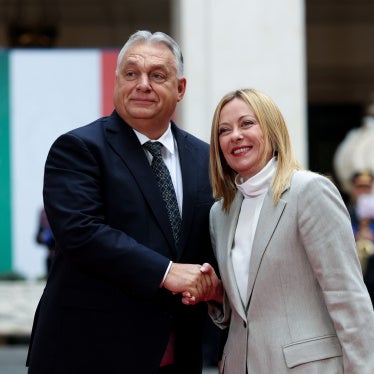So far, Sudanese President Omar al-Bashir has avoided arrest for alleged international crimes – including genocide – committed in Darfur. But his world has certainly gotten smaller.
On Monday, al-Bashir planned to visit Indonesia to attend the 60th anniversary of the 1955 Bandung Conference of Asian and African nations. The trip seemed designed to boost the credibility of the leader, who is wanted by the International Criminal Court (ICC) on charges of genocide, war crimes, and crimes against humanity. But his effort backfired, with al-Bashir cancelling the trip at the last moment.
A government source told the news outlet Sudan Tribune that al-Bashir’s plane was denied permission to fly through the airspace of some countries en route to Indonesia, although it is not known which ones. As news of the anticipated visit unfolded, outcry from local civil society groups and members of parliament soared.
These developments reinforce al-Bashir’s status as a fugitive from international justice with limited travel options.
This is not the first time al-Bashir has had trouble traveling, and his movement is rightly restricted. The Sudanese president is subject to two ICC arrest warrants that include charges of unlawful attacks on civilians, murder, acts of extermination, and rape, among other abuses.
The United Nations Security Council resolution that referred the situation in Darfur to the ICC requires Sudan to cooperate with the investigation, but Khartoum has obstructed its efforts. The resolution also urges all states – even those like Indonesia who are not members of the ICC – to cooperate with the court’s work to bring justice to victims in Darfur. Civil society groups – particularly in Africa – have repeatedly called for al-Bashir’s arrest and for governments to ensure he faces justice.
Over the years, many governments have chosen not to welcome al-Bashir on their soil. He has traveled to Asia only once – to China in 2011, amid criticisms by the UN – since becoming subject to arrest. Malaysia in 2011 chose to cancel a visit. South Africa and Botswana have made it clear that al-Bashir risks arrest if he enters their territories.
Al-Bashir also cancelled visits to attend conferences in Turkey and Kenya amid outcry over his possible attendance. In 2012, an African Union summit in Malawi was relocated after Malawi’s president made it clear al-Bashir was not welcome. In 2013, al-Bashir traveled to Nigeria for a conference, only to leave abruptly less than 24 hours later as local activists took legal action to compel his arrest.
The Sudanese president seems set on trying to rehabilitate his image with recent steps such as his certain re-election this month, and Sudan’s decision to join Saudi Arabia’s coalition to fight in Yemen.
But victims in Darfur deserve to see justice and governments should help see this done, including by restricting al-Bashir’s travel. He belongs in one place only – facing charges in The Hague.









